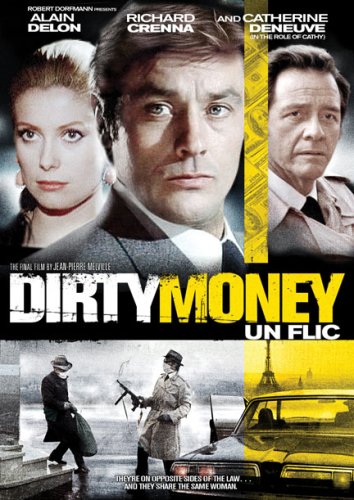
UN FLIC (DIRTY MONEY)
France/Italy, 1972, 98 minutes, Colour.
Alain Delon, Catherine Deneuve, Richard Crenna, Ricardo Cucciolla, Michael Conrad.
Directed by Jean- Pierre Melville.
Dirty Money: while the Americans gave us police action, police pairs and grim pictures of corruption, French director Jean- Pierre Melville continued his series of close-up studies of police and criminals. Le Samourai was a close-up study of a hired murderer. This film Un Flic (A Cop) is a study of a loner policeman. Both films starred Alain Delon in intense performances. Here Melville highlights the relentlessness of the policeman but he frames it in meticulously detailed filming of bank robberies, drug-smuggling and the details of the criminals' way of life. Thus the film is a fine French police entertainment and an interesting comparison with U.S. styles.
Un Flic is the last film directed by Jean Pierre Melville. As with many of his films, it is a crime story and a film about the police.
From 1945 to 1972 he wrote and directed many great French films. A considerable number of these were about crime and the police, several with Alain Delon including Le Doulos, Le Samourai and The Red Circle.
This is a Paris-set crime film about a robbery – and the money from the robbery becomes the centre of an even bigger robbery (which was criticised as being poorly filmed, especially in its use of miniatures). However, the intensity of the characters and screenplay more than make up for any technical defects. The film stars Alain Delon once again. This time he is on the side of the law. Richard Crenna is the owner of some bars in New York – but also a friend of the inspector. Catherine Deneuve is the leading lady.
The films of Jean Pierre Melville and his analysis of crime and investigation form a core group of French films on this subject and were very influential on other directors.
1. The overtones of the title? What tone does this give to this film? As a gangster film, as a film about flics (cops), a ‘flick’, as an entertainment? Was this an entertaining film? Why?
2. How well did the director use colour, music, location photography, the details of police work and atmosphere, the details of various plans and robberies? How did this add to the intensity of the film? Its impact?
3. What conventions of police and gangster drama did the film use? ordinarily? or did it improve on them?
4. Comment on the work of the editor for this film. Especially in the presentation of the initial bank robbery, the details, the timing etc.? The editor's work for the robbery from the train, with the use of the helicopter, and the details of Simon's work in the train itself? The editing of the film to show the interaction between the police work and the criminals' work? How did this add to the impact of the film?
5. How interesting was the film itself, its story, its exploration of crime and police? Why? Where were audience sympathies meant to lie? With the police, the criminals? Admiration for skill, disgust at crime and murder? Did you feel that the director manipulated audience sympathy?
6. Coleman, how interesting a portrait of a policeman, his initial work on patrol and his comments, overwork, the phone in the car and the constant calls, his lapses into brutality, his treatment of the transvestite for information, his morose attitudes, the fact of his affair with Cathy, some human element in his life, his plans for getting the criminals and the drug carriers, his final shooting of Simon, remorse? How humourless was he? How intense?
What future would he have in the police force?
7. How sympathetically were the thieves presented? initial seeing of them, that we saw them as criminals first, then as men? Admiration for their skill, the plans, the execution of their plans, their making good in failure? Simon and his leadership, his Parisienne background, suave style, his handling of the men and his coolness? His relationship with Cathy? His ordering of the others? His work in the train robbery? His realizing of the truth and his
being pursued? The irony of his death? How did this contrast with Paul and his wife? Paul and his retirement, his grievance against society because of no superannuation? His secrecy from his wife, his world-weariness and looking
into the mirror? The pathetic way in which he killed himself? Louis and his toughness? Especially the sequence where he was tortured by the police? Mark and his being murdered in the hospital? Was Cathy a convincing character? Relying on Catherine Deneuve’s presence? Her relationship to Simon and to Coleman? The coolness of her murdering the man in the hospital? What future did she have as she went away at the end?
8. Comment on the detail and its cinematic presentation of the first robbery: the rain, the deserted streets, the people in the bank, the teller and his courage, foolhardiness, the shooting, the trick at the station.
9. Comment on the dramatic impact of Cathy's killing Mark and the way that she did this, so coolly.
10. Comment on the drug smuggler and his presentation in the train. Comment on the details of the train robbery, the skilfulness and the way that it was filmed. Was this exciting and interesting? Why?
11. Comment on the coldness and the callousness of the people concerned in this film. Is this the reality of police work, criminal life, detection?
12. What comment on morality did the film make - in terms of justice, the grimness of life? What insight into criminal work and police work did the film give? Into the personal psychology of the police and the criminals?
13. How valuable a 'flick' was this?